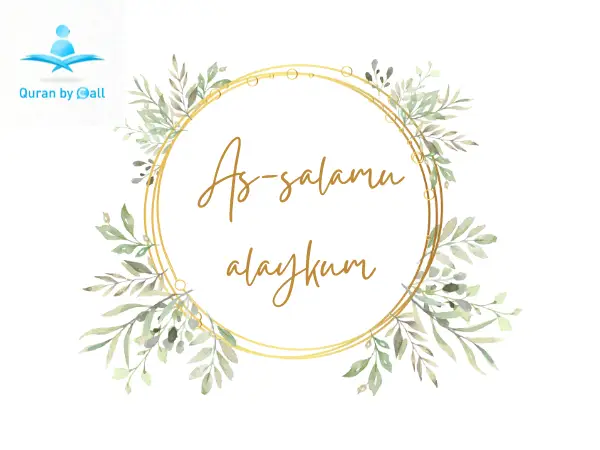Greetings are an essential part of human interaction, serving as a bridge to foster connection, respect, and goodwill. In Islam, greetings hold a special place, reflecting the faith’s emphasis on peace, compassion, and unity. The most common and cherished Islamic greeting is As-Salamu Alaykum, which translates to “Peace be upon you.” This article explores the significance of greetings in Islam, the profound meaning behind As-Salamu Alaykum, and how this simple phrase embodies the core values of the Islamic faith.
The Importance of Greetings in Islam
In Islam, greetings are more than just a social custom; they are an act of worship and a means of spreading peace. The Prophet Muhammad (peace be upon him) emphasized the importance of greeting others, stating, “You will not enter Paradise until you believe, and you will not believe until you love one another. Shall I not tell you about something which, if you do it, you will love one another? Spread the greetings of peace among yourselves.” (Muslim)
This hadith highlights the role of greetings in fostering love, unity, and brotherhood among Muslims. Greeting others is not only a Sunnah (practice of the Prophet) but also a way to earn rewards from Allah.
Quran by Call academy offers online classes of
1-Quran ( Reading & Memorization )
4- Arabic ( speaking & writing & Reading
The Meaning of “As-Salamu Alaykum”
The phrase As-Salamu Alaykum (السلام عليكم) is an Arabic greeting that means “Peace be upon you.” It is derived from the root word “Salaam,” which means peace, safety, and security. The greeting is a dua (prayer) in which one invokes peace and blessings upon the other person.
The full version of the greeting is As-Salamu Alaykum Wa Rahmatullahi Wa Barakatuh, which means “Peace be upon you, and the mercy of Allah, and His blessings.” This extended form adds an extra layer of compassion and goodwill, reflecting the depth of Islamic teachings on kindness and generosity.
The Virtues of Saying “As-Salamu Alaykum”
- A Command from Allah
Allah instructs believers to greet one another with peace in the Qur’an: “When you are greeted with a greeting, greet in return with what is better than it or at least return it equally.” (Qur’an 4:86)This verse emphasizes the importance of responding to greetings with equal or greater warmth, reflecting the Islamic principle of reciprocating kindness. - A Sunnah of the Prophet
The Prophet Muhammad (peace be upon him) encouraged Muslims to greet one another frequently. He said, “The one who is riding should greet the one who is walking, the one who is walking should greet the one who is sitting, and the smaller group should greet the larger group.” (Bukhari and Muslim)This teaching promotes humility, respect, and inclusivity in social interactions. - A Means of Spreading Peace
The greeting As-Salamu Alaykum is a powerful tool for spreading peace and harmony in society. By invoking peace upon others, Muslims fulfill their role as ambassadors of tranquility and goodwill. - A Source of Reward
Greeting others is an act of worship that earns rewards from Allah. The Prophet (peace be upon him) said, “When two Muslims meet and shake hands, their sins are forgiven before they part.” (Abu Dawud)
How to Respond to “As-Salamu Alaykum”
The appropriate response to As-Salamu Alaykum is Wa Alaykum As-Salam (وعليكم السلام), which means “And upon you be peace.” If the extended greeting is used, the response should be Wa Alaykum As-Salam Wa Rahmatullahi Wa Barakatuh (وعليكم السلام ورحمة الله وبركاته), meaning “And upon you be peace, the mercy of Allah, and His blessings.”
Responding to greetings is not only a social courtesy but also a religious obligation. The Qur’an states: “When you are greeted with a greeting, greet in return with what is better than it or at least return it equally.” (Qur’an 4:86)
The Etiquette of Greetings in Islam
- Initiate the Greeting
The Prophet (peace be upon him) encouraged Muslims to be the first to greet others. He said, “The best of the two persons is the one who begins with the greeting.” (Bukhari) - Greet with a Smile
A smile is considered a form of charity in Islam. Combining a warm greeting with a smile enhances the impact of the interaction. - Greet Everyone, Regardless of Status
Islam teaches equality and humility. Muslims are encouraged to greet everyone, regardless of their social or economic status. - Use the Full Greeting
While As-Salamu Alaykum is sufficient, using the extended form (As-Salamu Alaykum Wa Rahmatullahi Wa Barakatuh) adds more blessings and reflects greater sincerity.

